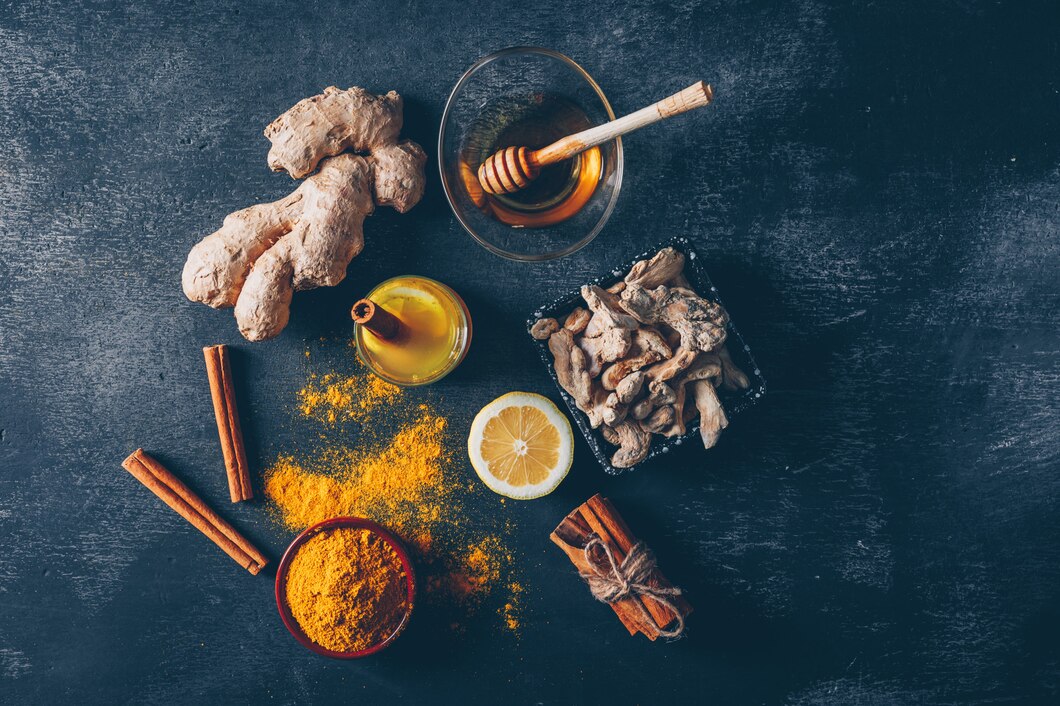Inflammation is the body's natural response to injury and infection, but chronic inflammation can lead to various health issues, including arthritis, heart disease, and cancer. Incorporating anti-inflammatory spices into your diet is a delicious and effective way to combat inflammation and promote health. This article delves into the benefits of key anti-inflammatory spices and provides tips on how to include them in your meals.
Key Anti-Inflammatory Spices and Their Benefits
-
Turmeric:
-
Active Component: Curcumin
-
Benefits:
-
Powerful anti-inflammatory and antioxidant properties
-
Reduces symptoms of arthritis and joint pain
-
Enhances brain function and lowers the risk of brain diseases
-
-
Usage:
-
Add to curries, soups, and smoothies
-
Combine with black pepper to enhance absorption
-
-
-
Ginger:
-
Active Component: Gingerol
-
Benefits:
-
Reduces muscle pain and soreness
-
Alleviates nausea and improves digestion
-
Lowers blood sugar levels and reduces heart disease risk factors
-
-
Usage:
-
Use in teas, stir-fries, and baked goods
-
Grate fresh ginger into sauces and dressings
-
-
-
Cinnamon:
-
Active Component: Cinnamaldehyde
-
Benefits:
-
Reduces inflammation and has antioxidant effects
-
Lowers blood sugar levels and improves insulin sensitivity
-
May protect against neurodegenerative diseases
-
-
Usage:
-
Sprinkle on oatmeal, yogurt, and fruit
-
Add to coffee, tea, and baked goods
-
-
-
Garlic:
-
Active Component: Allicin
-
Benefits:
-
Reduces inflammation and boosts immune function
-
Lowers blood pressure and improves cholesterol levels
-
May reduce the risk of heart disease
-
-
Usage:
-
Use in marinades, dressings, and sautés
-
Roast whole cloves for a milder, sweeter flavor
-
-
-
Cayenne Pepper:
-
Active Component: Capsaicin
-
Benefits:
-
Reduces pain and inflammation
-
Boosts metabolism and aids in weight loss
-
Supports digestive health
-
-
Usage:
-
Add to soups, stews, and chili
-
Use in spice rubs and hot sauces
-
-
-
Black Pepper:
-
Active Component: Piperine
-
Benefits:
-
Enhances the bioavailability of other anti-inflammatory compounds, such as curcumin
-
Possesses antioxidant and anti-inflammatory properties
-
May improve digestion and nutrient absorption
-
-
Usage:
-
Season vegetables, meats, and salads
-
Combine with turmeric for enhanced benefits
-
-
-
Cloves:
-
Active Component: Eugenol
-
Benefits:
-
Provides powerful anti-inflammatory and antioxidant effects
-
May reduce pain and improve liver health
-
Contains compounds that fight bacteria
-
-
Usage:
-
Use in baking, teas, and spice blends
-
Add to savory dishes for a warm, aromatic flavor
-
-
Incorporating Anti-Inflammatory Spices into Your Diet
-
Spice Blends:
-
Create custom spice blends using a combination of anti-inflammatory spices.
-
Use these blends to season meats, vegetables, and grains.
-
-
Teas and Beverages:
-
Make herbal teas with ginger, turmeric, and cinnamon.
-
Add spices to smoothies and juices for an extra health boost.
-
-
Cooking and Baking:
-
Incorporate spices into soups, stews, and casseroles.
-
Use in baking recipes for added flavor and health benefits.
-
-
Dressings and Marinades:
-
Create salad dressings and marinades using anti-inflammatory spices.
-
Enhance the flavor and health benefits of your meals with these additions.
-
Incorporating anti-inflammatory spices into your diet is a flavorful and natural way to combat inflammation and improve overall health. Turmeric, ginger, cinnamon, garlic, cayenne pepper, black pepper, and cloves each offer unique benefits that can enhance your well-being. By understanding how to use these spices effectively, you can take advantage of their powerful properties and enjoy a healthier, more balanced life.




